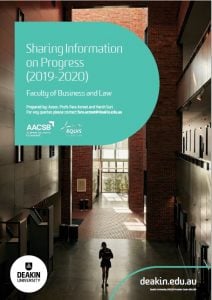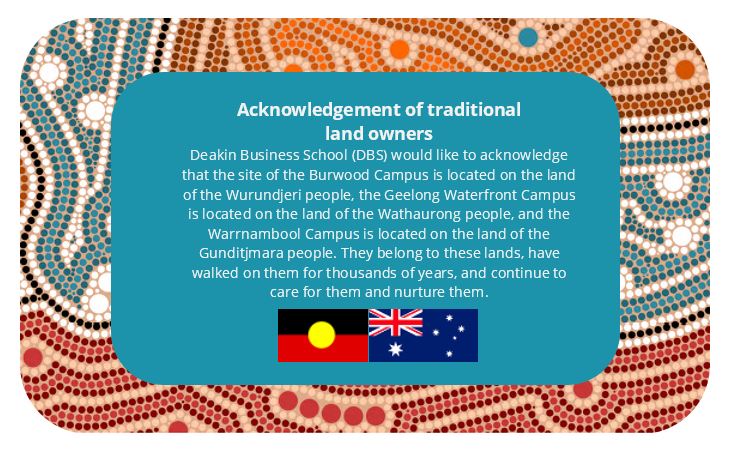
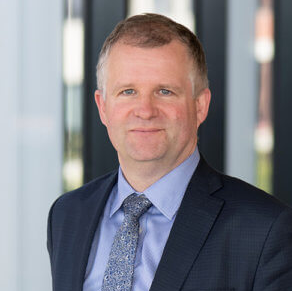
Deakin University
At Deakin, I believe we have a duty to use our capabilities and assets to demonstrate leadership in sustainability. Our strategic planning and governance are aligned to the United Nations Sustainable Development Goals, and these strong commitments represent Deakin’s next stage in our stewardshipof the environment and how we will realise a better future for our communities.
– Professor Iain Martin
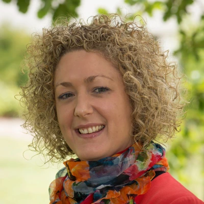
Deakin Business School
We do not inherit the Earth from our Ancestors; we borrow it from our children.
– Ancient Indian proverb
Deakin Business School (DBS) reaffirms its support of the Seven Principles of the Principles for Responsible Management Education: Purpose, Values, Teach, Research, Partner, Practice and Share. We are proud of our continuous efforts to integrate the Seven Principles into our institution strategy, culture, academic activities, and daily operations, and contribute to United Nations Sustainable Development Goals. Our value and purpose remain focused on sustainability but in a different way. As a student focused university, we have built on our values of sustainability to develop a strong culture of safety, mutual respect and inclusion with safety and wellbeing of our community as a top priority. In line with our new Strategic Plan Deakin 2030: Ideas to Impact announced in 2020, we have engaged with the SDG framework to advance responsible management education in an impactful way. We are doing it through pursuing meaningful and relevant research, embedding sustainability in our educational programs, engaging with the community and providing thought and action leadership to build sustainability-based partnerships as well as meaningful operational changes.
In the words of Albert Einstein, “in the midst of every crisis, lies great opportunity.” There is no question that in the post pandemic world, we have to adjust to a world that is going to be very different. At Deakin, we remain positive and open to opportunities so that we can come out of this crisis stronger as a responsible and sustainable institution that we can rightly be proud of.
Deakin reaches top 200 in QS World University Rankings for 2025
Deakin University has climbed 36 places to enter the world’s top 200 universities, according to the latest QS World University Rankings released today. Deakin’s overall rank of 197 is its best QS World University Rankings result and confirms its position in the top 1 per cent of universities worldwide.
The prestigious QS World University Rankings focus on five key indicators – Research and Discovery, Employability and Outcomes, Learning Experience, Global Engagement and Sustainability.
As Deakin prepares to celebrate its 50th birthday at the end of this year, it’s clear that Deakin’s strong connection to the community has been a cornerstone of our success. We believe in fostering meaningful partnerships that enhance the educational experience, drive innovative research outcomes and create a positive impact with a global reach.
Our recent rankings also reflect Deakin’s ongoing efforts to promote environmental stewardship and social responsibility.
Deakin recorded its strongest growth in the sustainability category, climbing 217 positions to rank 66th in the world and 13th nationally. The score reflects Deakin’s environmental impact in an area QS describes as a high priority for students.
The QS data also shows that Deakin was particularly successful in International Faculty (135th in the world) and Citations per Faculty (140th in the world).
Highlights for Deakin in recent years include:
Becoming the first university in the world to establish an international branch campus in India;
Securing approval to proceed with an international branch campus in Indonesia, in collaboration with Lancaster University;
Being announced as a Trailblazer University to deliver the Deakin University Recycling and Clean Energy Commercialisation Hub (REACH);
A significant uplift in research income and impact to drive social progress;
Deakin is number one in Victoria for Overall Student Satisfaction and has been for 14 years, and one of the top universities in Australia on this measure;
The establishment of the Deakin Indigenous Strategy 2023-2028 as a university-wide strategy; and
Founding of the Damion Drapac Centre to advance socially inclusive medical education, awarded Philanthropy Australia’s Inclusion Award.
DBS and PRME
DBS is a signatory to PRME since 2012. It has been termed as a PRME champion for the fourth time in the 2024-25 cycle. DBS is also an associate member of GRLI and is strongly committed to the UN Sustainable development Goals (SDGs) as reflected in its mission and values. DBS’s commitment to PRME and SDGs is reflected in its mission of being ‘a catalyst for positive change’.
It aims to be a catalyst for positive change through:
- progressive learning experiences for our students
- the power of our ideas and innovations
- engagement with our communities and partners, and
- empowering our students, staff and partners.
At DBS, we offer a supportive environment for students recognising the diverse range of backgrounds, experience and needs within our student community. DBS offers a broad range of business disciplines through six academic departments. A). Department of Management. B). Department of Marketing; c). Department of Finance, d) Department of Accounting, e), Department of Economics, and Department of Information Systems and Business Analytics.
This brief video summarises who we are:
Deakin Business School: This is who we are – Bing video
Deakin Business School continues to serve as a ‘PRME Champion’ for 2024-2025 for the fourth time in a row by the UN PRME secretariat.

The Faculty of Business and Law was recognised by the UN PRME secretariat for Excellence in the Sharing Information on Progress (SIP) report at the 2020 Virtual PRME Global Forum. Selected by a peer review group under the guidance of Giselle Weybrecht, author, Editor to the PRiMEtime Blog and expert in sustainable business education, this SIP Recognition highlighted the significant achievements in our work with the Six Principles of higher education set by the PRME (Purpose, Values, Method, Research, Partnerships and Dialogue).
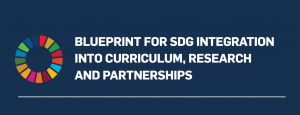
Deakin Business School (DBS) contributed to the Blueprint for Sustainable Development Goals Integration in Business Schools at the 2020 Virtual PRME Global Forum. Associate Professors Fara Azmat and Harsh Suri from DBS headed this contribution as research and curriculum leads, respectively. The Blueprint is a step-by- step guide for all Business Schools to implement SDGs across their curriculum, research and partnerships. It was developed in collaboration with the global PRME signatories and was launched officially at the forum.
Diversity and Inclusion Taskforce
As part of our commitment to the Principles for Responsible Management Education, the Faculty of Business and Law launched its Diversity and Inclusion Taskforce in 2021. The taskforce has a particular focus on reducing inequalities (SDG10), achieving gender equality (SDG 5), and building an effective, accountable, and inclusive institution (SDG 16).
By using a taskforce model, we hope to provide a work and learning environment within the Faculty of Business and Law which is inclusive and respectful, enabling all staff and students to feel welcome, safe, and supported to thrive.
The Diversity and Inclusion Taskforce consists of three streams provide that provide leadership, guidance and support the implementation of initiatives in the areas of:
- indigenous respect
- equity and opportunity
- inclusive culture.
Deakin Business School PRME contacts
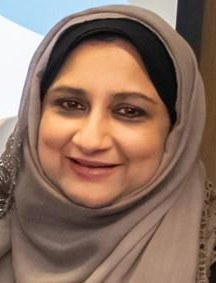
Associate Professor Fara Azmat
Deakin Business School PRME Director
Ph: +61 3 925 17095
Email: [email protected]

Dr Ameeta Jain
Deputy Deakin Business School PRME Director
Ph: +61 3 924 46151
Email: [email protected]
Related Links

